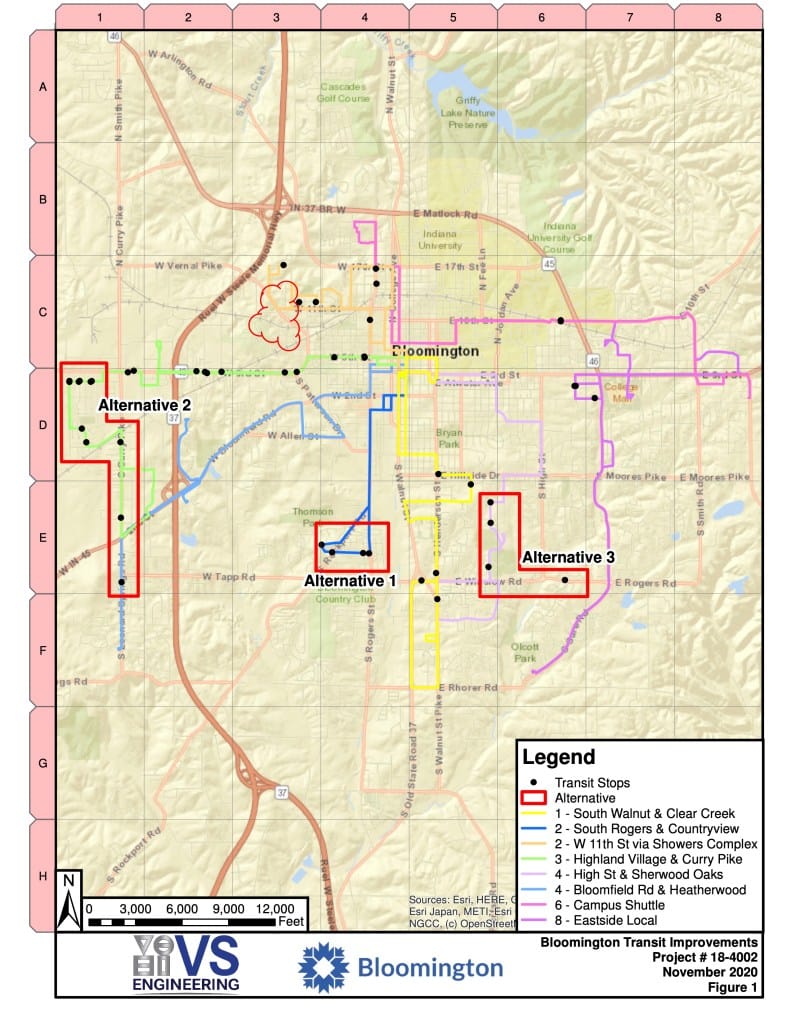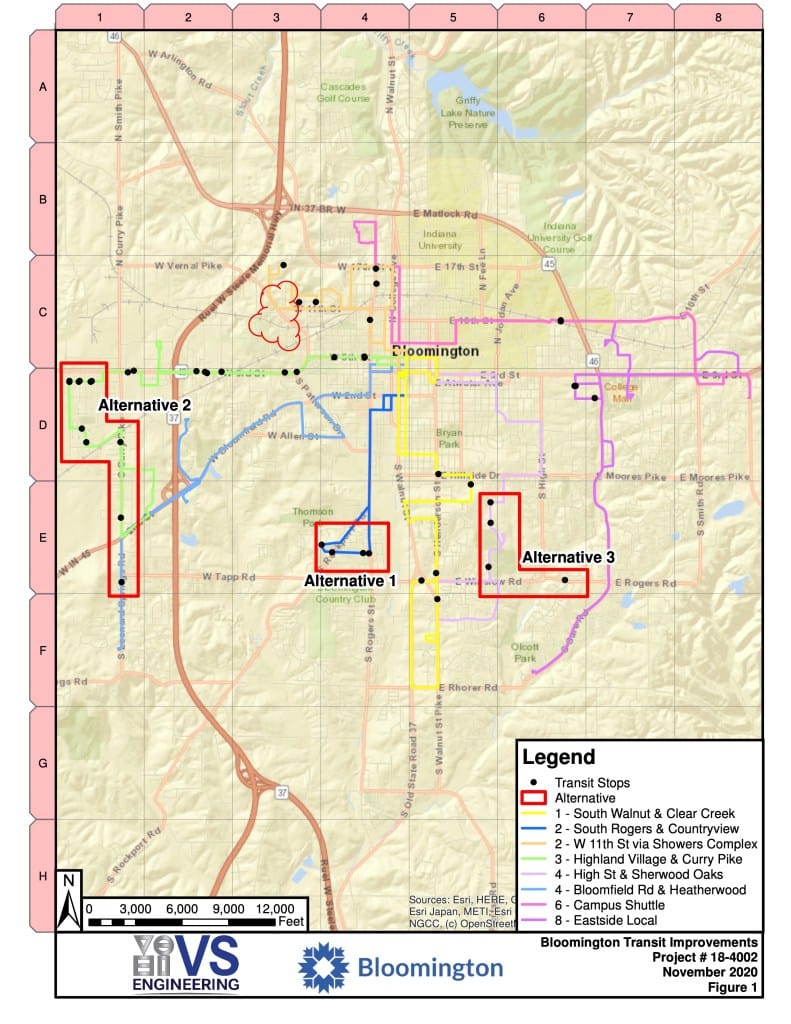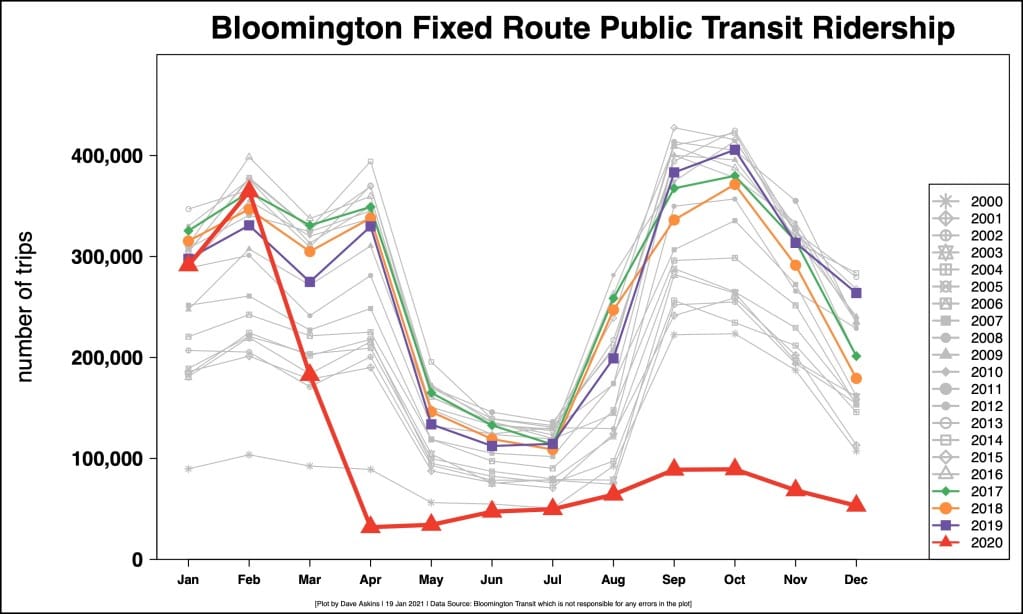Pandemic continues to crush public transit ridership, Bloomington doing extra bus stop improvements



The grim news out of Bloomington Transit’s Tuesday board meeting was not a surprise. The 53,187 bus trips taken on fixed-route service in December 2020 amounted to just 20 percent of the 263,828 trips taken in 2019.
That continued the depressed trend that started after Indiana University’s 2020 spring break in mid-March, when the COVID-19 pandemic hit. It’s not a surprise, because normally about 70 percent of Bloomington’s public bus ridership is by Indiana University affiliates. Even when classes resumed, because a lot of instruction was conducted remotely, students had reduced local travel needs.
BT general manager Lew May said he thinks it could take years before ridership levels are back to the same level they were at the start of 2020.
Balanced against the expected bad ridership numbers was a proposal from the city’s public works director, Adam Wason, who said that at the end of last year, his department “rubbed nickels together to make dimes”—to identify an extra $150,000 that could be used for bus stop accessibility improvements. Wason already had $250,000 to spend on bus stops, from the first phase of the city’s Recover Forward initiative, which was approved by the city council in mid-August of 2020.
At Tuesday’s meeting, Wason asked the BT board to chip in another $85,000 to cover the full slate of bus stop improvements that had been identified. Board members approved the request on a unanimous vote. The $485,000 worth of bus stop work is expected to help address the 20 percent of the roughly 500 bus stops in the city that are rated in poor condition, according to May.
In other business on Tuesday, the board agreed to an extension of the renegotiated funding agreement with Indiana University that allows students, staff and faculty to board without paying a fare. BT’s pandemic protocols, which were also extended by the board at its meeting, have included waiving the normal $1 fare for all riders and allowing passengers to board through the rear doors.
Historically, the university has paid BT around $1 million a year to allow its affiliates to board BT buses without paying a fare.
Since last fall, in light of the reduced ridership by IU affiliates, the university and BT have agreed to an arrangement that takes historical payments by IU to BT as a base. The base is then reduced by a multiplier equal to the fraction of revenue hours that BT offers in a given month, compared to its normal levels of service. That allows the monthly payment to vary as BT’s services levels vary.
Last fall, BT general manager Lew May said that BT is currently running between 65 and 75 percent of its normal revenue hours on campus routes. That works out to about $60,000 a month that IU is paying BT under the re-negotiated arrangement. ($87,720 * 0.70).
Because the reduced payments correspond to reduced expenses by BT, because of reduced levels of service, there’s no impact on BT’s budget, according to May.
May’s anticipated retirement in August 2021 led the five-member board to form a committee—James McLary and Marilyn Hartman—to start studying the question of hiring a new general manager directly, compared to the current alternative used by BT, which is to contract with a third-party transit corporation. That third-party management company is RATP Dev. May is an employee of RATP Dev not Bloomington Transit.
May has served as general manager for Bloomington’s public transportation system for more than two decades.
Also in connection with May’s anticipated retirement, the board authorized the issuance of a request for proposals for outside legal services. When the BT board has had a need for legal services in the past, it has relied on the city of Bloomington’s legal department. The city has billed BT at a rate of $86.95 an hour. In 2020, the city’s legal staff billed BT for 23.5 hours, according to BT controller Christa Browning.
The interest in having outside legal counsel of its own is to cover situations where expertise in transit matters is required. Those transit-specific matters could include those related to a choice between a management company to provide a general manager versus making a direct hire.




Comments ()